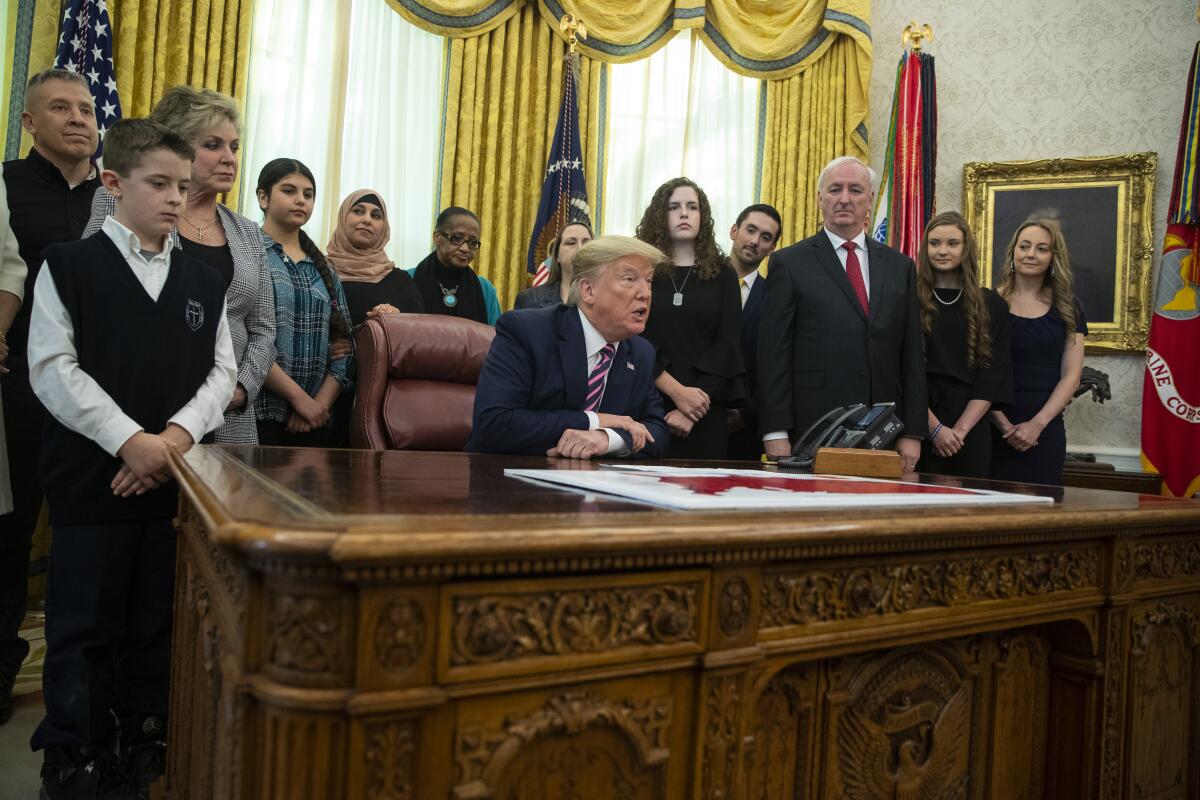Trump courts religious groups with rules that worry LGBTQ groups

Washington — President Trump unveiled a slew of rule proposals on Thursday intended to expand the ability of religious groups to get federal money and to loosen restrictions on how they spend it, courting a valuable political constituency as the Senate began a critical phase of the impeachment process.
The nod toward Trump’s evangelical base in an election year comes as the president tries to highlight his efforts to keep previous campaign promises. Trade agreements with Mexico, Canada and China also reached milestones this week even as the Senate began deciding whether to remove Trump from office. While playing to his base, Trump’s rules are concerning to LGBTQ groups, which see them as possibly giving religious groups license to discriminate.
“It is a culture war,” Trump said at an Oval office ceremony, where he sat surrounded by religious activists and children from a variety of religious backgrounds. On his desk lay a large copy of the 2016 electoral map showing the areas where he won.
“You have two sides, and you have a side that believes so strongly in prayer and they’re being restricted, and it’s getting worse and worse, and I think we’ve made a big impact,” he added.
The package of religious proposals announced Thursday are broad and their potential impact is uncertain, given that it will take months to approve rules in nine Cabinet agencies and potentially longer to interpret and defend them from expected court challenges.
The rules are primarily aimed at forcing states to get rid of prohibitions against awarding grant money to religious groups.
Some attorneys say they could also help churches and other religious groups argue in court that they have more latitude in offering programs that exclude or stigmatize LGBTQ people or require prayer as a condition of participation. Trump also reinforced existing protections for students who form prayer groups at school.
“The emphasis is entirely on protecting the religious exercise of providers,” said Ira Lupu, a professor emeritus of law at George Washington University who specializes in the relationship between government and religion. There is “no attention to or emphasis on the rights of prospective beneficiaries of these services to be free from discrimination.”
Robert Tuttle, another professor at George Washington’s law school, said the impacts could be broad, considering the number of groups that receive federal money — “basically anybody that is providing services, social welfare services to folks is going to be touched in some way by these federal funding rules.”
Presidents George W. Bush and Obama both embraced initiatives intended to allow religious groups to get more federal funding for community activities such as homeless sheltering, marriage counseling or addiction treatment.
But they were required to separate those programs from churches’ religious activities in an effort to uphold the constitutional separation of church and state. Those requirements remain but the Trump administration has tried to weaken their enforcement in states or through federal agencies that distribute grant money.
“It looks like the administration has gotten out ahead of where the courts are,” said Tuttle, a professor of law and religion, who believes the new rules could open the door to providers offering health and other services with a strong religious component.
Many of Trump’s evangelical supporters have felt under attack from requirements that they keep federally funded activities separate, believing they were being coerced to adopt more socially liberal policies, though in many cases the fears were not borne out.
Trump on Thursday blamed what he called “a growing totalitarian impulse on the far left that seeks to punish restrict and even prohibit religious expression.”
Trump’s emphasis on those issues has helped him attract a powerful and loyal voting block, even as many Christian conservatives have disapproved of Trump’s personal behavior.
“This is very much for political credit between now and the election,” said Lupu, who cited the long lag time required to enact and interpret the new rules.
Administration officials who briefed reporters on the condition of anonymity said the new rules would not lift existing anti-discrimination rules or defy court rulings. They said people who do not like a group offering social services can choose another group.
But the administration has generally sided with religious groups in cases involving anti-discrimination laws. And opponents of the new rules point out that many communities lack options for social services that are not church-run.
“We are deeply alarmed,” said Jenny Pizer, law and policy director for Lambda Legal, which advocates for the LGBTQ community. The new rules “are very likely to increase discrimination.”
The most specific change announced Thursday involves groups that get money from the Department of Health and Human Services. Current rules require religious groups that provide drug treatment and other services to disclose that alternative programs are available elsewhere and to tell patients that they will not discriminate based on religion.
Trump’s proposed rules would eliminate the disclosure requirement, which administration officials say is an unfair burden on religious groups.
Pizer said she worries that, for example, LGBTQ people could be sent to court-ordered substance abuse programs run by groups that stigmatize them and ultimately hurt their ability to recover.
“The idea was to offer a choice of a faith-based agency,” she said. “but not to have the government pushing members of the public into a religious environment.”
More to Read
Get the L.A. Times Politics newsletter
Deeply reported insights into legislation, politics and policy from Sacramento, Washington and beyond. In your inbox three times per week.
You may occasionally receive promotional content from the Los Angeles Times.











